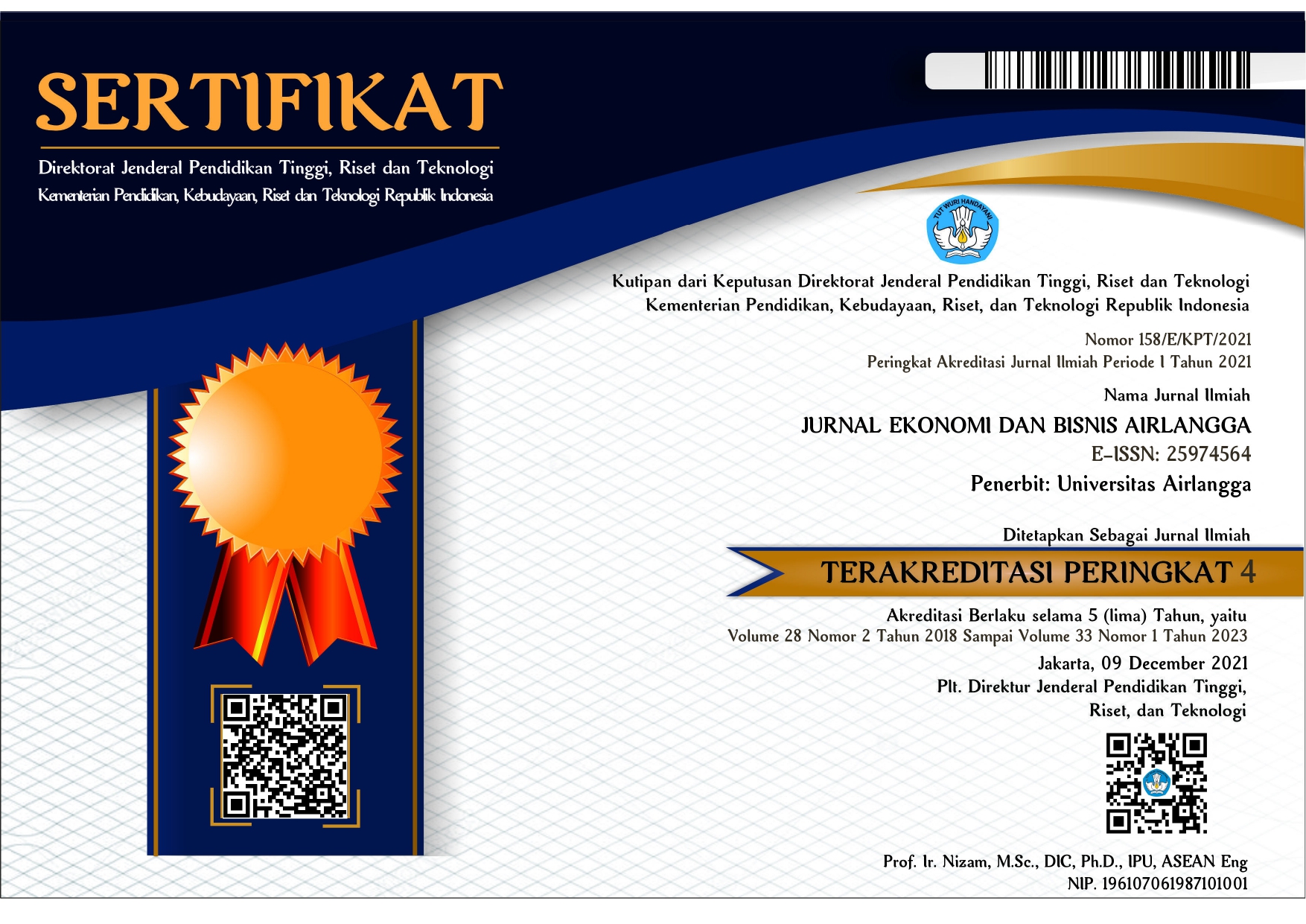FAKTOR SOSIAL TERHADAP KESEJAHTERAAN ISLAMI KELUARGA MUSLIM DI KOTA SURABAYA
Downloads
Welfare is an important aspect of the quality of human life. Welfare according to Islamic law requires the material aspect and spiritual well-balanced manner. Al Quran explains that faith and piety will have an impact on the lives of both in Surah An Nahl (16): 97. This studies based on Quranic paradigm and quantitative analysis, followed up by theory and previous research to produce religiosity, income and social factors which have an effect on Moslem families welfare. In the development of science, this study found that to modify religiosity theory by Glock and Stark (1965) into Islamic religiosity by Ancok and Suroso (2001), income theory by Mankiw (2001), Samuelson and Nordhaus (1997), and Maqasid Syariah theory by Shatibi (Al Rasyuni, 2005) and Ibnu Ashur (2006). The purpose of this study is to present the effect of religiosity dimensions, income and social factors toward Islamic welfare. This study was conducted in Ampel area. Primary data is collected from interview 90 respondents with questionnaire and data analysis is made by using Partial Least Square (PLS). The finding of the study revealed that religiosity and income affect Islamic welfare. Social Factors did not affect Islamic welfare. These results may have implications for family and development theory. The limitations of this study is that the numbers of constructs and indicators were relatively limited. It will be useful for future research studies to add another variable and indicator.
Al Rasyuni, Ahmad. 2005. Imam Al-Shatibi's: Theory of the Higher Objectives and Intents of Islamic Law, London, The International Institute of Islamic Thought.
Amin, Ayoeb. 2010. Pengaruh Komitmen Kerja Islami terhadap Motivasi, Status serta Kesejahteraan Keluarga Muslim di Kabupaten Pekalongan Provinsi Jawa Tengah, Disertasi, Surabaya, Program Pascasarjana. Universitas Airlangga.
Ancok, D & Suroso, F, N. 2001, Psikologi Islami, Yogyakarta, Penerbit Pustaka Pelajar.
Ashur, Ibnu. 2006. Treatise on Maqasid al-Shari'ah, London, The International Institute of Islamic Thought. Chapra, M, Umar, 2001. Masa Depan Ilmu Ekonomi Sebuah Tinjauan Islam, Jakarta, Gema Insani Press.
Elmanora, Muflikhati & Alfiasari, 2012, Kesejahteraan Keluarga Petani Kayu Manis, Jurnal Ilmu Keluarga dan Konseling 5(1) :58-66.
Fan, J.X. 1997. Expenditure Patterns of Asian Americana: Evidence from the US Consumer Expenditure Survey 1980-1992, Family and Consumer Sciences Research Journal, 25(4), 339-368.
Galbraith, C.C dan Galbraith, D.M. 2007. An Empirical Note on Entrepreneurial Activity, Intrinsic Religiosity and Economic Growth, Journal of Enterprising Communities People and Places in Global Economy, 1(2), 188-201.
Ghozali, Imam. 2006. Structural Equation Modeling Metode Alternatif dengan Partial Least Square. Semarang, UNDIP
Iannaccone, laurence. R. 1980. Religion, Values, and Behavioral Constraint, Working Paper George Mason University. 2-15.
Iskandar dkk. 2006. Faktor-Faktor yang mempengaruhi Kesejahteraan Keluarga, Info Kesehatan Msyarakat, 9:133-141.
Samuleson, Paul A& Nordhaus, William, D, 1997, Makroekonomi, Edisi keempat. Jakarta, Erlangga. Shihab Quraish. 2007. Tafsir Al Misbah, Volume 7, Jakarta, Mizan.
Suroso, Fuat Nashori & Mucharam, Rachmy Diana, 2002, Mengembangkan Kreativitas dalam Perspektif Psikologi Islam. Yogyakarta, Menara Kudus.
The journal allows the author to hold the copyright of the article without restrictions.
The journal allows the author(s) to retain publishing rights without restrictions
The legal formal aspect of journal publication accessibility refers to Creative Commons Attribution Share-Alike (CC BY-SA).
Jurnal Ekonomi dan Bisnis Airlangga (JEBA) is licensed under a Creative Commons Attribution-ShareAlike 4.0 International License



.png)












